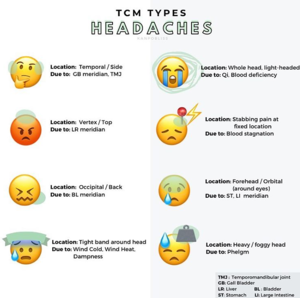According to a 2016 WHO report, 50% of adults worldwide have had at least one headache in the last year, and 30% of those have reported experiencing migraines. Headaches can range from a mild annoyance to extremely debilitating, drastically affecting your quality of life. The International Headache Society has a 16 page list of headache classifications from the western medicine diagnosis approach. Traditional Chinese Medicine (TCM) also has its own classification system that has been identifying and treating headaches for over 2,000 years! All these different types of headaches mean that having a blanket treatment for everyone is just not going to work. TCM thrives by creating individualized treatments using a root and branch approach to healing, and headaches are no exception. The root of the condition is identifying and treating the cause of the headache, which includes determining which meridian (acupuncture channel) system is involved. The branch is treating the actual pain from the headache through the meridian system by clearing local blockage and blocking pain pathways.
One very important way that we learn more about identifying the root of your headache is by looking at the specific location of your pain. Location is very important as the meridian system has channels that flow over certain areas of your head. One of the reasons for your headache is that there is a blockage within one of those meridians. When we identify both the location and the meridian, we can then treat that specific meridian with acupuncture to decrease the severity, frequency, and duration of headaches.
Let’s look at some locations of common headaches and what meridians they correspond to!
Temporal Headache (temple area/sides of head/one-sided): Gallbladder meridian
-
Possibly corresponding symptoms: top of shoulder pain/tightness, tinnitus
Occipital Headache (back of the head towards the base of the skull): Urinary Bladder meridian
-
Possibly corresponding symptoms: neck pain, back pain
Vertex headache (top of head): Liver meridian
-
Possible corresponding symptoms: stress, high blood pressure, feelings of anger/frustration
Whole head + lightheaded: Deficiency in Qi and Blood
-
Possible corresponding symptoms: fatigue, dizziness upon standing, pale complexion

Classifying and treating headaches with an integrative approach, using both TCM and western medicine, is an extremely powerful tool to finally obtain some relief. I have seen great success in treating headaches with my own patients and the clinical research demonstrates the beneficial effects of acupuncture. For example, this 24 week clinical trial published in JAMA Internal Medicine April 2017 found that acupuncture significantly decreased the frequency of migraines in the 245 participants studied. If you are suffering from headaches I encourage you to reach out to myself or your local practitioner to learn more about your treatment options with TCM. As I mentioned before, taking an integrative approach to headaches is very important. I normally work closely with your MD, or specifically your neurologist, to rule out any concerning underlying conditions that could be causing your headaches.
